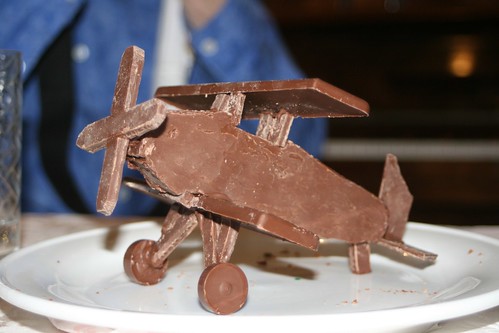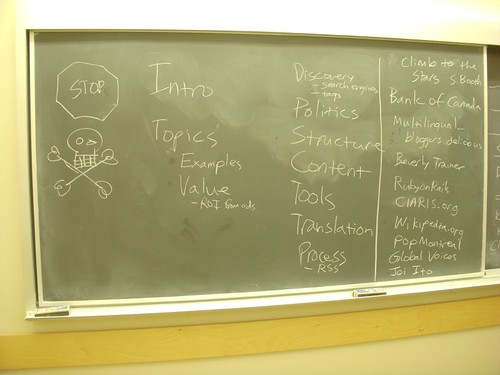You may have noticed that yet again I failed to post my Monday Funnies Video. Hey, sometimes you just have to wait until inspiration hits. My sister passed along the link to this amazing performance by Anita Renfroe. There are many versions on YouTube, but I picked this one because in the information box there are the lyrics. Take a listen: YouTube – The Mom Song Sung to William Tell Overture with Lyrics
Of course I enjoyed this both as a mom and as a daughter.
Anita nails it. What an act of knowledge sharing!
But the video inspired more.
I have been thinking about how to evoke the history online community as a thread of our current and future practices. My emerging idea is to look at the intertwining between personal stories about online community along with the technology development that has enabled this new form. I’m not so much interested in the precise history, but the intertwining between our desires to connect, our practices and how the technology community has responded to those pushes and pulls. From the early internet connections through BBS and email, to today’s microblogging and social networks. How might this more evocative retelling inspire our next practices and developments? I had initially thought about this in terms of a set of visuals. But after hearing Anita’s paean to a mother’s advice, I’m expanding my possibilities. Yes, I’m probably about to get in even deeper over my head and may capabilities. That’s why I need you.
Stories + Advice + evocative visuals + some sort of performance art. Can I pack that usefully into a 45 minute presentation at Community 2.0? Will it be USEFUL? I figure I’ll start by exploring each of these, then keep what rises to the surface.
I’ve asked you for your stories. (More still appreciated). Now I’d like you to give me any and all of your advice about designing, building, being in online communities. The shorter and pithier the better. I’ll try and do a version of Anita’s song. Can you help me? Post them in the comments or on your blog and put a link back to this post and I’ll find them. I’ll be, as always, in your debt.
Just as inspiration, here are Anita’s lyrics
“The Mom Song”
Get up now
Get up now
Get up out of bed
Wash your face
Brush your teeth
Comb your sleepyhead
Here’s your clothes and your shoes
Hear the words I said
Get up now! Get up and make your bed
Are you hot? Are you cold?
Are you wearing that?
Where’s your books and your lunch and your homework at?
Grab your coat and gloves and your scarf and hat
Don’t forget! You gotta feed the cat
Eat your breakfast, the experts tell us it’s the most important meal of all
Take your vitamins so you will grow up one day to be big and tall
Please remember the orthodontist will be seeing you at 3 today
Don’t forget your piano lesson is this afternoon so you must play
Don’t shovel
Chew slowly
But hurry
The bus is here
Be careful
Come back here
Did you wash behind your ears?
Play outside, don’t play rough, will you just play fair?
Be polite, make a friend, don’t forget to share
Work it out, wait your turn, never take a dare
Get along! Don’t make me come down there
Clean your room, fold your clothes, put your stuff away
Make your bed, do it now, do we have all day?
Were you born in a barn? Would you like some hay?
Can you even hear a word I say?
Answer the phone! Get off the phone!
Don’t sit so close, turn it down, no texting at the table
No more computer time tonight!
Your iPod’s my iPod if you don’t listen up
Where are you going and with whom and what time do you think you’re coming home?
Saying thank you, please, excuse me makes you welcome everywhere you roam
You’ll appreciate my wisdom someday when you’re older and you’re grown
Can’t wait till you have a couple little children of your own
You’ll thank me for the counsel I gave you so willingly
But right now I thank you not to roll your eyes at me
Close your mouth when you chew, would appreciate
Take a bite maybe two of the stuff you hate
Use your fork, do not burp or I’ll set you straight
Eat the food I put upon your plate
Get an A, get the door, don’t get smart with me
Get a grip, get in here, I’ll count to three
Get a job, get a life, get a PHD
Get a dose of,
“I don’t care who started it!
You’re grounded until you’re 36”
Get your story straight and tell the truth for once, for heaven’s sake
And if all your friends jumped off a cliff would you jump, too?
If I’ve said it once, I’ve said at least a thousand times before
That you’re too old to act this way
It must be your father’s DNA
Look at me when I am talking
Stand up straighter when you walk
A place for everything and everything must be in place
Stop crying or I’ll give you something real to cry about
Oh!
Brush your teeth, wash your face, put your PJs on
Get in bed, get a hug, say a prayer with mom
Don’t forget, I love you
And tomorrow we will do this all again because a mom’s work never ends
You don’t need the reason why
Because, because, because, because
I said so, I said so, I said so, I said so
I’m the mom, the mom, the mom, the mom, the mom!!
Ta da!!! (less)
 But dang, it can be useful. Here is a great example from travel guru/insider
But dang, it can be useful. Here is a great example from travel guru/insider 

